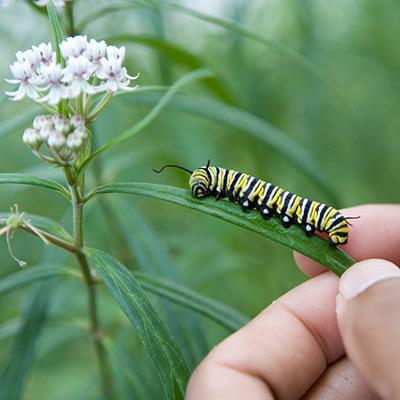Ecology and evolutionary biology (EEB) is the study of the patterns and processes that structure ecological systems and drive evolutionary change. Understanding the interactions between organisms and their environments is both fascinating and critical for solving environmental problems. As ecologists, we study natural populations, communities and ecosystems and the links among them. As evolutionists we elucidate the past history of natural assemblages and how organisms respond to changing environments. And as organismal biologists we seek to understand how plants, animals and microbes function in relation to their environment. We delight in interacting with students; we integrate undergraduate and graduate education, and foster communication between science and society.
The department makes use of field research sites (from lakes to forests and fields to the ocean coast; locally, nationally and around the world), museum collections (we manage the Cornell Museum of Vertebrates), and modern laboratory facilities (we manage the Cornell Isotope Laboratory and the Evolutionary Genomics Core Facility). Undergraduates in EEB have opportunities to participate in laboratory and field-based research across a broad array of ecological and evolutionary projects.
Associated Faculty
- Nicholas L. Abbott
- John Abowd
- Héctor D. Abruña
- Uriel Abulof
- Dorit Abusch
- Hom Acharya
- Gerard Aching
- Begüm Adalet
- Anne Adams
- Jawad Addoum
- Leslie A. Adelson
- Lammi Adem
- Adeolu Ademoyo
- Elizabeth Adkins-Regan
- Kraig Adler
- Nick Admussen
- Amanda Agan
- Rachit Agarwal
- Anurag Agrawal
- Marcelo Aguiar
- Frederick M Ahl
- Chloe Ahmann
- Misha Ailsworth
- Eriko Akamatsu
- Esra Akcan
- Jenny Aker
- Christopher Alabi
- Sule Alan
- Eric Alani
- Julie Albertson
- Juan Manuel Aldape Muñoz
- Jim Alexander
- Annetta Alexandridis
- Ti Alkire
- Angelica Allen
- Richard Waldron Allmendinger
- Glenn Altschuler
- Silvia Amigo-Silvestre
- Kadji Amin
- Mary Ammerman
- Nandini Ananth
- Laura Anca Chichisan
- Erik L Andersen
- Meghan Anderson
- Ryan Anderson
- Adam Anderson
- Benjamin Anderson
- Nozomi Ando
- Giulia Andreoni
- Georgia Marina Andreou
- Talbot M. Andrews
- P.A. Angelopoulos
- Elizabeth S. Anker
- Santiago Anria
- Helena Aparicio
- Catherine M. Appert
- Charles F Aquadro
- Adam Clark Arcadi
- Lina Maria Arcila Hernandez
- Tomás Arias
- Diego Arias-Fuentes
- Mahdi Asgari
- Mahdi Asgari
- Vivekinan Ashok
- N‘Dri Thérèse Assié-Lumumba
- Hakan Atakisi
- Emad Atiq
- Kevin Attell
- Lauren Aycock
- Yimon Aye
- Mona Azzam
- Oumar Ba
- Leslie Babonis
- Christine Bacareza Balance
- Alyssa Bachmann
- Ewa Bachminska
- Andrea Bachner
- Allen Back
- Ryan Badman
- Youn Jue (Eunice) Bae
- Sina Bahrami
- Barbara A. Baird
- Kavita Bala
- Anindita Banerjee
- Edward E. Baptist
- Michela Baraldi
- Dan M. Barbasch
- Daniel A. Barbash
- Rosemary Barber
- Matthew Baron
- Catherine Barrera
- Caitie Barrett
- Elizabeth Barrios
- Levon Barseghyan
- Benjamin Barson
- Buz Barstow
- Aaron Bartels-Swindells
- Estela Bartol-Martín
- D. Mitra Barua
- Biplab Basak
- Jeremy M. Baskin
- Andrew Bass
- Daniel Bass
- Ernesto Bassi
- Kaushik Basu
- Arnab K. Basu
- David Alexander Bateman
- David Bathrick
- Rosemary Batt
- Nicholas Battaglia
- Marco Battaglini
- Sherene Baugher
- Nora Bayly
- Ivan Bazarov
- Rachel Bean
- Emily Bednarski
- Colin Behrens
- James F. Bell
- Duncan Bell
- Serge J. Belongie
- Daryl J. Bem
- William Bemis
- Nicole Benevento
- John Benning
- Richard F Bensel
- Yuri Berest
- Mabel Berezin
- Anne Berger
- Joshua Berman
- Sarah E. Bernstein
- Judith Eleanor Bernstock
- Gregory Besharov
- Sarah Besky
- Spencer Beswick
- Alex Betts
- Tomás J. Beviá
- Monica Bevia
- Aditya Bhattacharjee
- Francesco Bianchi
- Dr. Robert D. Biggar
- Louis Billera
- Malcolm Bilson
- Kenneth Paul Birman
- Kendra Bischoff
- Dina Bishara
- Adrienne Bitar
- Amiel Bize
- Xak Bjerken
- Theo Black
- Jean Blackall
- Anne M. Blackburn
- Alexandra Blackman
- Kate Blackwood
- Kristin Blake
- Melissa Blake
- Kristina Blake-Hodek
- Garrick Blalock
- Jim Blankenship
- Franci Blassberg
- Bronwen Bledsoe
- Justin Bloesch
- Robert Bloomfield
- Sara Bloxsom
- Lawrence Blume
- Eberhard Bodenschatz
- Bonna Boettcher
- Vicki Bogan
- Fredric Bogel
- Brandon Bogusz
- John Boochever
- David Borden
- Erik Born
- Andy Borum
- Daniel Boucher
- John S Bowers
- Jonathan Aaron Boyarin
- Carole Boyce Davies
- Jack Bradbury
- Jeremy Braddock
- Teagan Bradway
- Mary Pat Brady
- Charles Brainerd
- Giulia Brancaccio
- Ross Brann
- Jason Brauth
- Tad Brennan
- Anthony Bretscher
- Charles Brittain
- Kenneth Brown
- Laura Brown
- William J Brown
- Wayles Browne
- Michelle Bruer
- Seth Brufsky
- Jack Bryant
- Susan Buck-Morss
- Jamie Budnick
- Samuel Buggeln
- NoViolet Bulawayo
- Happiness Bulugu
- Valerie Jane Bunce
- Austin Bunn
- Richard Burkhauser
- Anthony Burrow
- Jan Burzlaff
- Lance Spencer Bush
- Timothy Buttsworth
- Judith A. Byfield
- Jodi A. Byrd
- James Byrne
- María Luciana Cadahia
- Andrew Campana
- Timothy C. Campbell
- Romaine Campbell
- Donald B. Campbell
- Murillo Campello
- Xiaodong Cao
- Michael J. Carbone
- Colleen Carey
- Allen R. Carlson
- Calum MacNeill Carmichael
- Laurel Carney
- Tracy Hamler Carrick
- John Carruthers
- Cathy Caruth
- Laura Casasanto
- Marianella Casasola
- Debra Ann Castillo
- Peter Caswell
- Julieta Caunedo
- Andrew Cavanna
- Stephen Ceci
- Luisa Cefalà
- Jean Bernard Cerin
- Richard A. Cerione
- Flaminia Cervesi
- Judy Cha
- Iván Chaar-López
- Brian Chabot
- Mario Chacón
- Ryan Chahrour
- Thak Chaloemtiarana
- Susan Chandler
- Julia Chang
- Derek Chang
- Pamela Chang
- Misako Chapman
- Stephen U. Chase
- Cynthia Chase
- Shami Chatterjee
